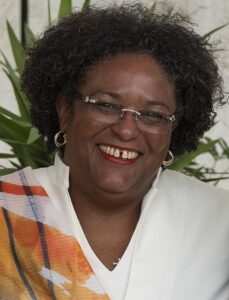by Gianna Pontecorboli
New York – Since its creation 78 years ago, the United Nations has never had a woman in charge. Now, however, the latest General Assembly has shown some serious signs of change. And, for the first time, the name of someone who could break through what seemed like an insurmountable barrier. “Only four women signed our founding document. And if we look around, not enough has changed,” said Antonio Guterres a few days ago, during the opening week of the major international conference. Sitting not far away, the Prime Minister of Barbados, Mia Amor Mottley, must have listened with a smile.
 The idea of putting a woman at the head of the largest international organisation is certainly not a new one, and Guterres himself, when he was first elected in 2016, had to compete with thirteen candidates for the prestigious position, seven of whom were women. To support the women’s cause, a group called GWL Voices, founded by Irina Bukova, former director-general of Unesco, Helen Clark, former Prime Minister of New Zealand, and Susana Malcorra, chief of staff to former Secretary-General Ban Ki-moon, has recently begun to campaign vigorously for a number of measures, including gender rotation in the Presidency of the General Assembly and, of course, the election of a female secretary-general. “We cannot imagine a better future of peace, prosperity and human rights without having half the world’s population on board,” said Maria Fernanda Espinosa, a politician from Ecuador, former President of the General Assembly and one of the group’s supporters.
The idea of putting a woman at the head of the largest international organisation is certainly not a new one, and Guterres himself, when he was first elected in 2016, had to compete with thirteen candidates for the prestigious position, seven of whom were women. To support the women’s cause, a group called GWL Voices, founded by Irina Bukova, former director-general of Unesco, Helen Clark, former Prime Minister of New Zealand, and Susana Malcorra, chief of staff to former Secretary-General Ban Ki-moon, has recently begun to campaign vigorously for a number of measures, including gender rotation in the Presidency of the General Assembly and, of course, the election of a female secretary-general. “We cannot imagine a better future of peace, prosperity and human rights without having half the world’s population on board,” said Maria Fernanda Espinosa, a politician from Ecuador, former President of the General Assembly and one of the group’s supporters.
Now, after many futile attempts, something has finally begun to happen. In the shadow of a meeting that has clearly shown the needs of a world very different from the one that conceived and created the international organisation at the end of the Second World War, attention has turned to a female figure who seems perfect to win the battle. According to custom, which calls for geographical rotation, the successor to the current Secretary-General, whose mandate expires in 2026, should be a Latin American, and among the names already circulating are the former President of Colombia and Nobel laureate Juan Manuel Santos, the current Director of the International Atomic Agency, Rafael Grossi, and Maria Fernanda Espinosa herself. But all eyes are on Mia Amor Mottley, a politician who seems to have all the skills and qualities to meet the challenges ahead. And the manoeuvres to get her name out in front have not gone unnoticed by those who have followed the confidential talks and meetings in the corridors of Turtle Bay.
What makes her candidacy interesting, of course, is that she belongs to a geographical area, the small islands of the Caribbean, which has never found a real audience in the international community and which is now particularly threatened by climate change and the backwardness of the international financial market.
First elected in 2018 and re-elected four years later by a landslide, Mia Amor Mottley immediately demonstrated her charisma and incredible energy, not only in defending her small island, but also in making everyone aware of the problems of so many Countries similar to hers. So much so that when Barbados became a republic in 2021 and left the British Commonwealth for good, even Queen Elizabeth, the outgoing monarch, wrote her an affectionate letter of congratulations.
Only a year later, in 2022, the determined Prime Minister launched a new initiative, called the Bridgetown Initiative, to explore a bold reform of the international financial world to make it more accessible to small Countries kneecapped by the climate crisis. In April this year, her project was updated and relaunched as Bridgetown 2.0, in collaboration with the UN, and her six priorities, starting with easier funding from the International Monetary Fund and other international financial institutions and the restructuring of long-term debt, will be discussed at the end of October by the World Bank, the Monetary Fund in Washington and at COP28 in Dubai in November. “I can’t think of any other world leader in recent history, apart from Obama, who has received so much attention from the international community,” said a UN diplomat, speaking on condition of anonymity.
For now, it is clear that everything remains in the shadows. At UN headquarters, Mia Amor Mottley made no comment, although she did not deny her interest in a possible candidacy. Her positions, many fear, may not sit well with some members of the Security Council, who are responsible for proposing the chosen name to the General Assembly for a vote. But in the world of diplomacy, no one doubts that her qualities and activism will silence those who argue, not unreasonably, that the choice of the next secretary-general depends on ability, not gender.
In the text, Mia Mottley
On the cover, the headquarters of the United Nations
























